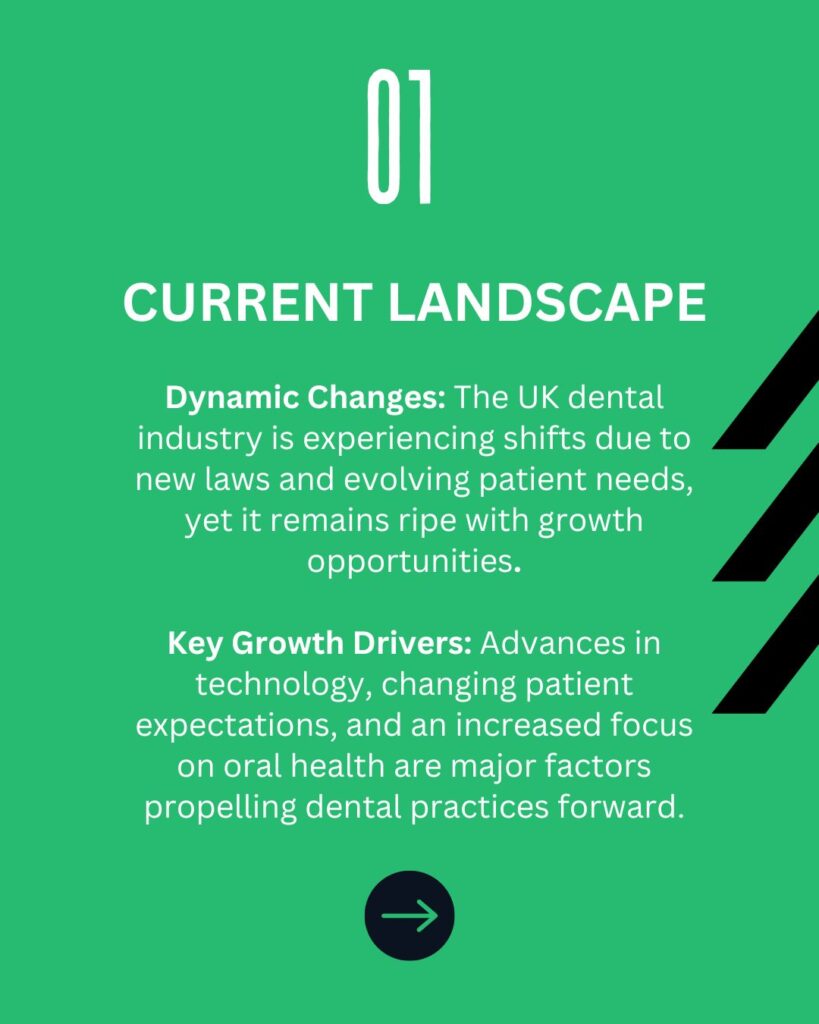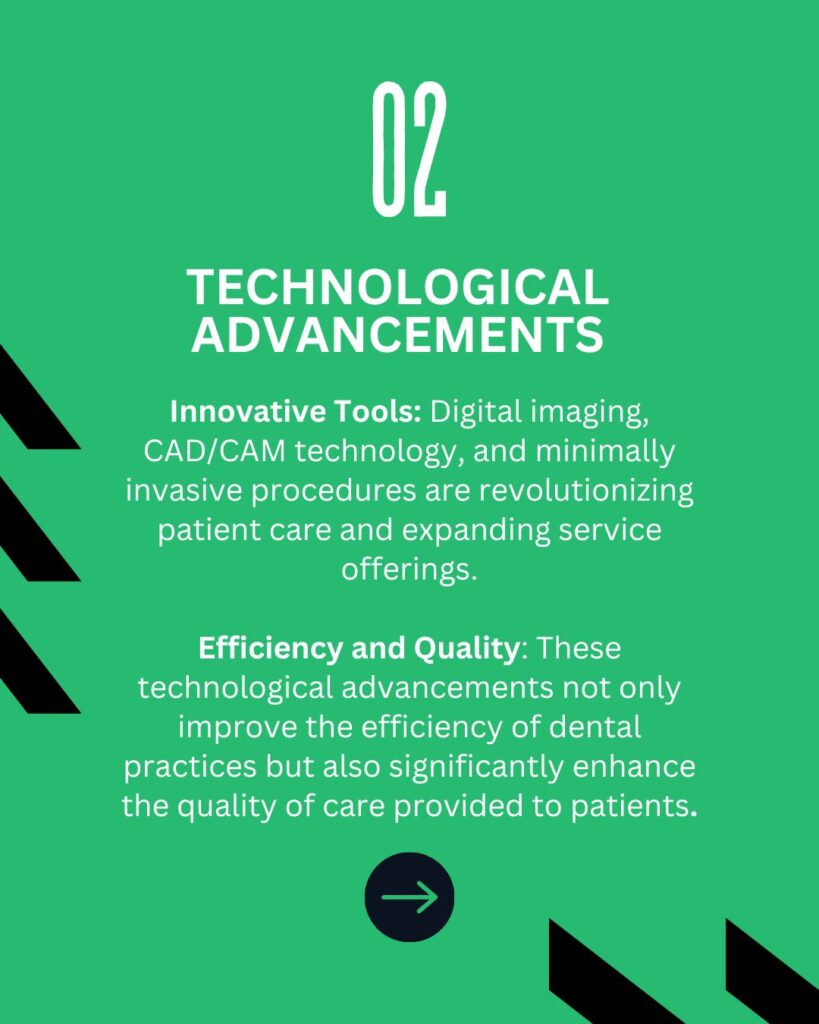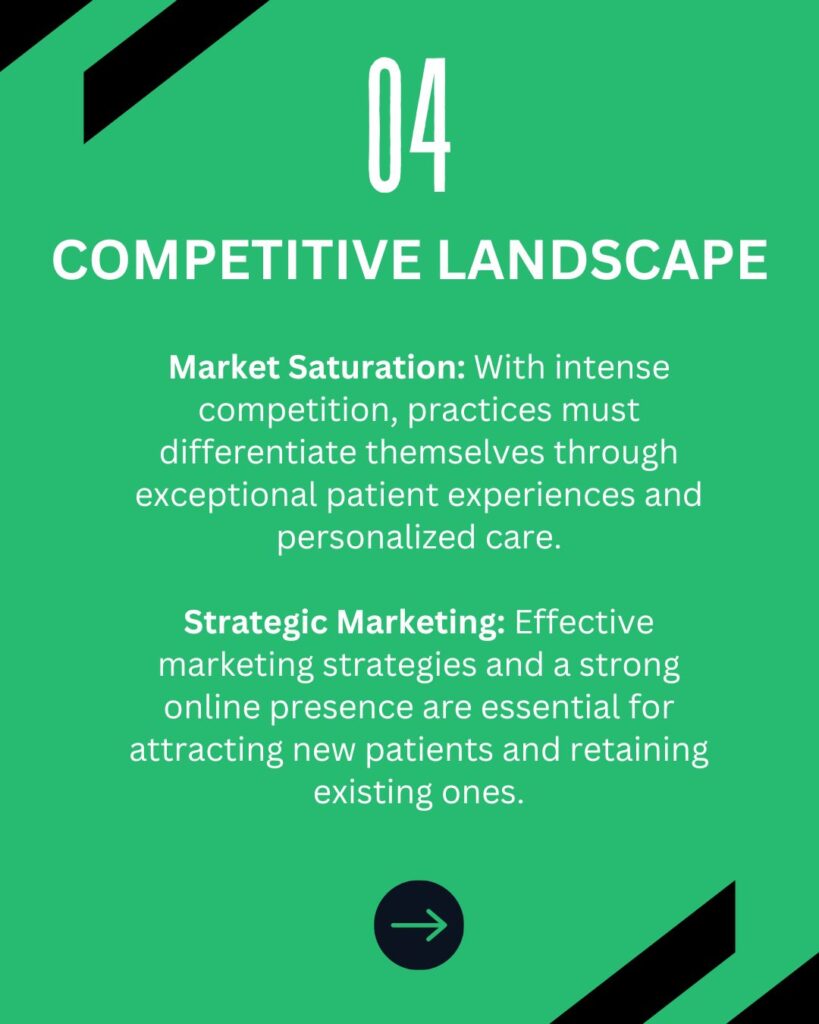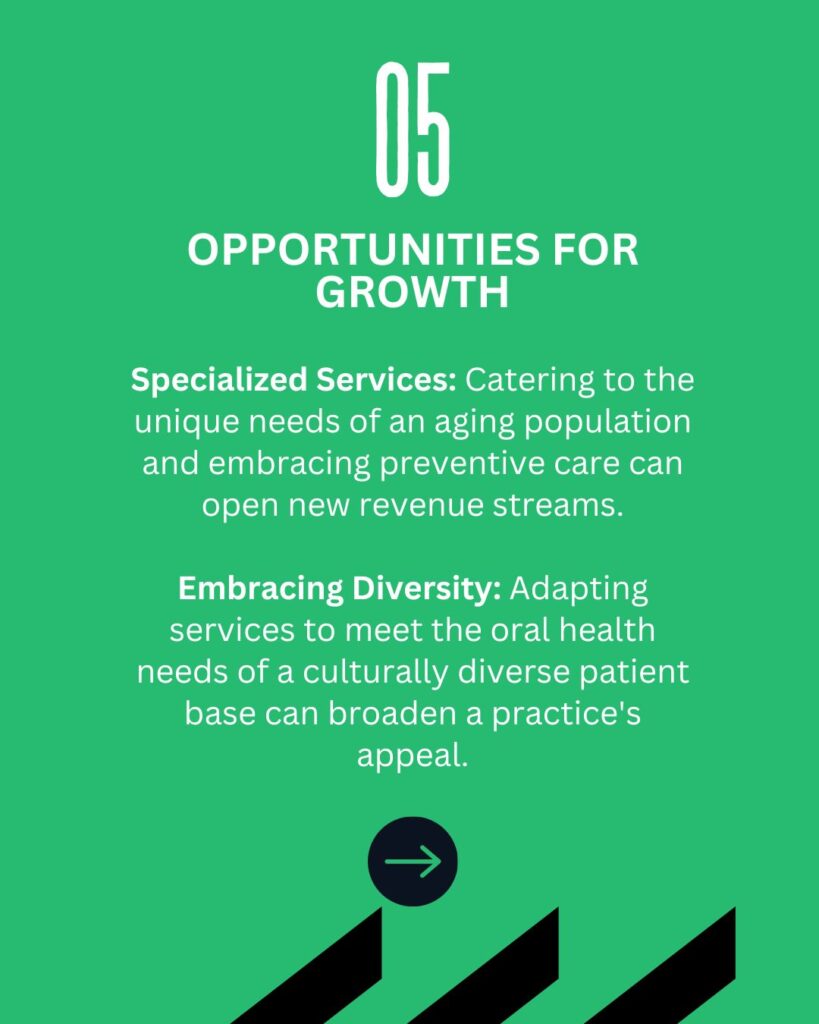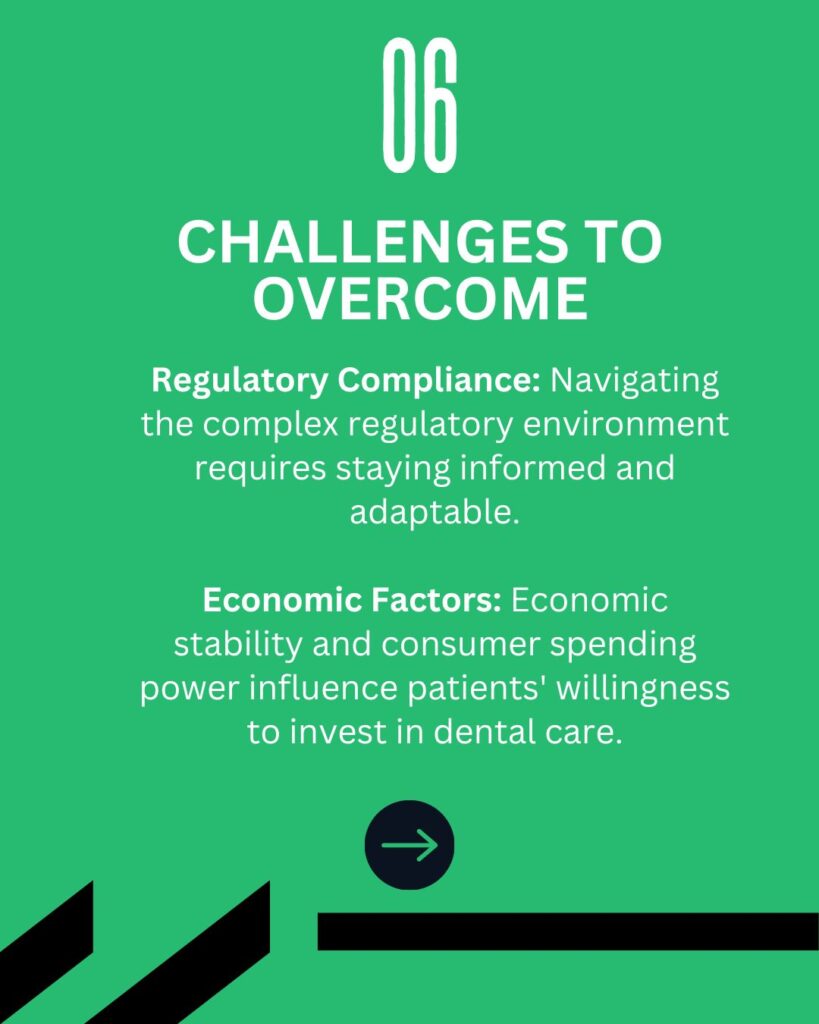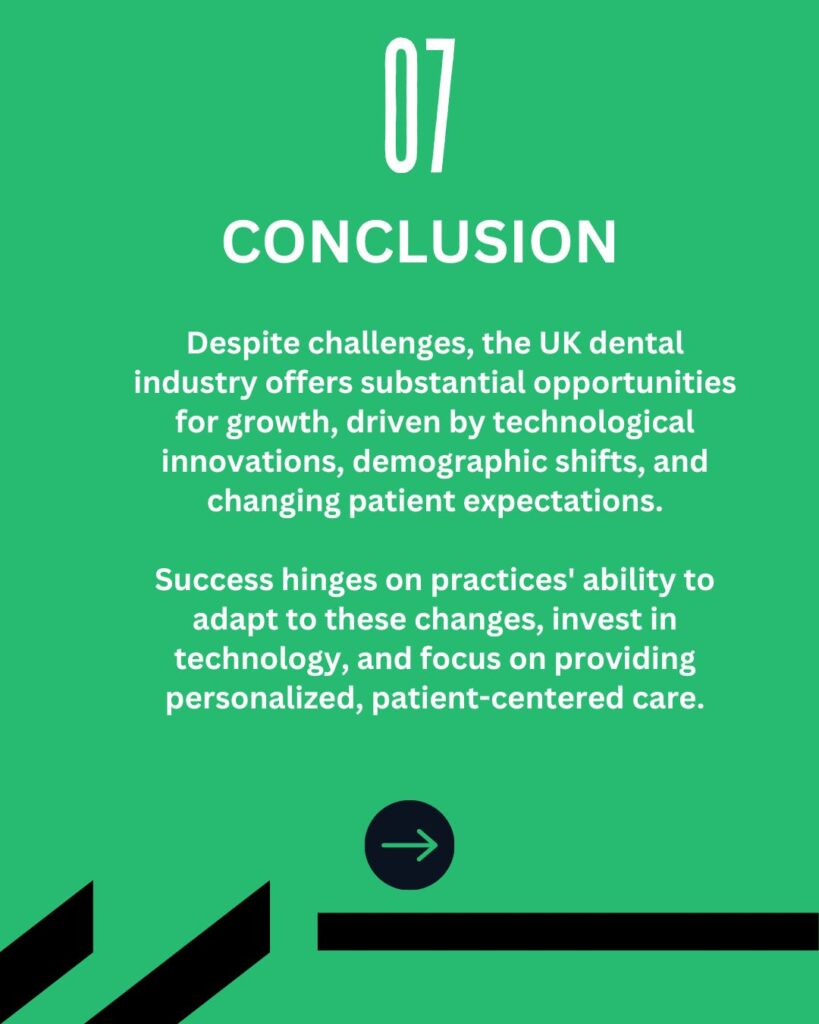How to Start, Scale and Sell a Dental Group – Webinar
Why Build a Dental Group?
The dental industry is seeing a marked shift. Independent practices are increasingly coming together under unified ownership, creating dental groups that streamline operations, leverage combined resources, and increase market influence. For many practice owners, the shift from running a single practice to establishing a network of clinics offers both enticing benefits and real challenges.
Building a dental group isn’t just about scaling up. It’s about creating a cohesive, efficient, and patient-centred organisation that can thrive in today’s competitive healthcare landscape. With more patients expecting convenient, consistent care, group practices have an advantage in meeting this demand through shared resources, better operational efficiency, and unified branding.
However, developing a dental group requires a strategic approach, a robust understanding of market trends, and a keen eye on the specific benefits and challenges unique to the dental sector.
This guide will walk you through the essential steps to build and grow a successful dental group.
Understanding the Current Landscape of the Dental Industry
The dental industry today is evolving. In 2023, the UK dental services market was valued at $933 million, with projections indicating growth to $1,317 million by 2030 [1].
Click here to read about The Climate for Dental Practice Growth in the UK.
While solo practices remain common, the trend towards group practices is gaining traction, driven by the need for greater efficiency and the ability to better handle administrative, clinical, and financial tasks.
In many regions, market consolidation has increased as dental groups can offer competitive pricing, better insurance handling, and access to specialised services under one roof. This shift is particularly appealing to dentists looking for a sustainable and profitable business model that can weather economic and regulatory changes.
Click here to read more about choosing between starting and buying a dental practice.
“Across the UK an interesting phenomenon is occurring in the UK Dental landscape, more and more dental groups are emerging all in search of quality dental practices to purchase.
They are searching high and low for quality dental practices that will contribute to the group’s EBITDA.
Increasingly, we are hearing from clients stating that their turnover is around £2m and they would like to build over the next few years to sell it for £20m!
Sounds great. However, the key factor some of the groups have not thought about is the debt-level funding they require. If you need to borrow £19m in order to sell it for £20m, I don’t think you would be so inclined to build a dental group.”
Arun Mehra, Samera CEO
The Benefits of Owning and Operating a Dental Group
MMR reports, in 2023, 50% of UK adults visited an NHS dentist, and of those who visited a dentist in the past five years, 60% attended for a general check-up [2]. Clearly, there are distinct business advantages to owning a dental group:
Economies of Scale
As dental practices join forces under a group model, operational costs often decrease per unit, or in this case, per clinic. Supplies, equipment, and even services like marketing and HR are more affordable when shared across multiple locations.
Enhanced Market Share
In a dental group, you have the opportunity to increase your reach by establishing multiple locations, attracting a wider patient base. This not only enhances revenue potential but also improves the group’s brand recognition, creating a positive feedback loop for patient retention and acquisition.
Improved Operational Efficiency
Centralising back-office functions such as accounting, payroll, billing, marketing and HR across locations allows the group to streamline processes, reduce redundancies, and minimise costs.
Attracting Talent and Specialists
With a group structure, there’s the flexibility to offer specialised roles or higher salaries, attracting top talent who may prefer working in a larger, structured organisation.
Diversified Revenue Streams
A group model allows for greater service diversification, offering patients everything from general dentistry to orthodontics and periodontics under one umbrella, which can drive higher revenue and patient satisfaction.
Greater Resilience to Market Fluctuations
A larger, diversified dental group can withstand market shifts more easily than a solo practice, as it benefits from multiple revenue sources, a larger patient base, and a broader geographic reach.
The shift from a single-practice model to a dental group is a multi-step journey that demands foresight, planning, and a clear understanding of the benefits and complexities involved. This guide is here to help you navigate each phase effectively.
Defining Your Vision and Strategy
Starting a dental group requires clarity of purpose and direction from the outset. A well-defined vision and strategy serve as a roadmap for both immediate and long-term success, guiding every aspect of your operations and growth. By setting realistic goals, identifying your target market, and defining your unique brand, you establish a foundation that will help your group stand out and thrive.
Setting Short-Term and Long-Term Goals
Effective planning begins with setting both short-term and long-term goals that align with your vision. Short-term goals may focus on practical steps to launch or expand, such as:
- Securing initial funding for new practices or expanding existing ones.
- Building a core team of dental professionals and support staff.
- Streamlining operations across the group to create consistency.
Long-term goals should support sustained growth and establish your group’s position in the market over time. These might include:
- Achieving a specific market share within a defined region or demographic.
- Introducing new services or specialisations as patient needs evolve.
- Expanding to multiple locations to increase accessibility for patients.
Setting measurable, time-bound goals ensures you can track progress and adapt your approach as your dental group grows. Clearly defined milestones also help to keep your team aligned and motivated.
Identifying the Target Market
Statista reveals household spending on dental services has seen a twofold increase over the past decade [3]. With that in view, defining your target market becomes essential for effective growth.
Knowing whom you aim to serve can shape everything from your choice of location to the services you offer and the way you market them. Key considerations include:
- Demographics: Understanding the demographics of your target market helps you cater services accordingly. For example, a family-oriented practice in suburban areas might focus on general dentistry and preventive care, while a city-centre clinic could attract professionals seeking cosmetic treatments.
- Geographic Location: Deciding where to establish your group’s practices can significantly influence patient volume. Evaluate areas where dental care demand is unmet or growing. Conduct market research to understand competitor presence, population density, and the general dental health landscape in potential regions.
- Patient Preferences and Needs: Tailoring your services to meet the specific needs of your target patients can help differentiate your dental group. Consider factors like income levels, common dental health concerns, and the types of treatments most in demand in your chosen area.
With a clear picture of your target market, you can develop marketing strategies that appeal directly to your patients and enhance patient acquisition efforts.
Defining Your Brand and Unique Selling Proposition (USP)
In a competitive market, your brand and USP are critical for standing out. Defining a strong brand identity and a clear USP helps create a compelling reason for patients to choose your dental group over others.
- Crafting Your Brand Identity: Your brand represents the values, tone, and style of your dental group. It’s reflected in everything from your clinic design and online presence to how you engage with patients. Whether you aim to project a family-friendly atmosphere, a high-tech clinical environment, or a premium patient experience, your brand identity should resonate with your target audience.
- Establishing a Unique Selling Proposition (USP): A USP is what sets your dental group apart from competitors. It may be based on your specialised services, a particular patient experience, or a commitment to accessible pricing. For example, if your group provides flexible hours for working professionals or focuses on eco-friendly practices, make this a central part of your brand messaging.
- Communicating Consistently Across Locations: As a group practice, it’s crucial to maintain consistency in your branding and messaging across all locations. This builds trust and recognizability with patients, creating a cohesive experience no matter which location they visit.
Legal and Financial Structure
Building a dental group is as much about establishing a solid legal and financial foundation as it is about patient care and operational growth. The structure you choose for your group will impact everything from liability and tax obligations to daily operations and long-term financial health. This step focuses on selecting the right business structure, addressing critical legal requirements, and planning for financial sustainability.
Choosing the Right Business Structure
Selecting an appropriate business structure is essential when setting up a dental group. Your choice will affect liability, taxation, and how profits are distributed. Common business structures include:
- Partnership: A partnership allows two or more individuals to share ownership of the dental group. Partnerships are relatively straightforward to establish, but all partners share responsibility for liabilities. While profits are passed through to each partner, partnerships require clear agreements regarding responsibilities, profit distribution, and decision-making authority.
- Limited Company: A limited company structure provides the benefit of limited liability, protecting personal assets if the business encounters financial difficulties. Additionally, limited companies may have tax advantages and greater access to financing options. However, they require more administrative tasks and reporting obligations.
- Limited Liability Partnership (LLP): An LLP combines elements of a partnership and a limited company, providing limited liability while retaining the flexibility of a partnership model. This structure is often suitable for dental groups where each partner wants liability protection and decision-making input.
- Sole Trader or Sole Proprietorship: While more common for solo practitioners, a sole proprietorship may be an option for a single-practice owner expanding into a group. However, this structure lacks liability protection and may not be suitable for a group with multiple practitioners or locations.
Selecting the right structure involves weighing factors like risk tolerance, tax implications, and plans for expansion. Consulting with a lawyer and accountant can provide insight into the best structure for your dental group’s goals.
Contact us to find out more
Legal Considerations
Navigating the legal landscape is essential to operate a dental group smoothly and avoid regulatory issues. Key legal considerations include:
Licensing and Registration
Each dental practice within the group must hold the appropriate licences to operate legally. Dental groups often require additional registrations depending on the location and services offered. Ensure each clinic complies with national and local regulations, which may vary depending on your practice’s location.
Regulatory Compliance
Dental practices are subject to strict regulations concerning patient care, safety standards, and record-keeping. A dental group must comply with standards set by regulatory bodies, such as the Care Quality Commission (CQC) in the UK, to ensure patient safety and data protection. This may involve routine inspections, staff training, and adherence to hygiene and health protocols.
Professional Liability and Insurance
Given the high stakes involved in patient care, professional liability insurance is essential for dentists and potentially for dental groups too. This insurance protects against claims of negligence or malpractice, providing financial protection for the business and individual practitioners. Additionally, public liability insurance may be necessary to cover any incidents involving patients or visitors on the premises.
Employment and HR Policies
Expanding into a group practice involves hiring and managing a team across multiple locations. Employment law compliance is vital, covering areas such as contracts, workplace safety, and employee rights. Ensure that HR policies are robust and consistent across the group to support a professional and compliant work environment.
Click here to read 7 Legal Pitfalls to Avoid when Buying a Dental Practice.
Financial Planning
A well-thought-out financial plan is vital for the growth and sustainability of your dental group. Key areas to address include:
Startup Costs
Building a dental group requires significant initial investment, including premises, equipment, staff recruitment, and marketing. Estimate and plan for these upfront costs to avoid unexpected financial strain. Many dental group owners seek external funding, such as loans or investors, to cover initial expenses.
Cash Flow Management
Managing cash flow is crucial, particularly during the early stages when patient volume may be inconsistent. Establish a budget that accounts for fixed and variable costs, such as salaries, rent, supplies, and utility bills. Regular cash flow monitoring can help ensure that the group remains financially healthy and can handle any unexpected expenses.
Tax Planning and Compliance:
Tax planning is another essential aspect of financial management. Different business structures have varied tax obligations, and it’s crucial to understand and plan for these in advance. Consult with a tax advisor to explore potential deductions, and establish a tax strategy that aligns with your business structure and revenue model.
Financial Reporting and Accountability:
As your dental group grows, maintaining accurate financial records and generating regular reports is critical for informed decision-making. Financial reports, such as profit and loss statements and balance sheets, provide insights into the group’s performance and help identify areas for improvement. Ensuring transparent and accurate financial reporting also aids in securing additional funding if needed.
Taking the time to establish a solid legal and financial structure will allow your dental group to operate with stability and compliance, setting the stage for successful growth and effective management. Each of these elements forms the backbone of a sustainable dental group, enabling it to withstand market changes and deliver consistent, high-quality patient care.
Structuring a Dental Group for Optimal Tax Benefits
As you may have seen in some of our previous blog posts, the last few years have seen the rise of many dental groups throughout the UK.
With practices across the country facing financial difficulty, we have seen even more dental groups either spring up or continue to grow as practices are snapped up at lower-than-expected prices.
Whether the groups consist of just a couple of practices or even a dozen, dental groups are becoming more common and are growing all the time.
Importance of Structuring Your Dental Group
Always start with the end in mind. What do we mean by this? We mean your tax planning needs to fit around and compliment your ultimate goal or plan for your business. And your life!
It is important to note that dental groups come in all shapes and sizes, there is not a one-size-fits-all solution.
One of the problems we’ve seen dental groups making is primarily with how they are structured.
The problem is that many groups simply grow by raising the finance the purchase new practices, surgeries and equipment and they give no thought to how the businesses are structured.
In other words, they haven’t considered the tax consequences of how their group should be structured.
For instance, if you own several dental practices but some are held under your own name, while others are held as limited companies, this can have real consequences to your accounts and tax later on.
This is especially true once you start to grow your group further.
Possible dental group structures
We are often asked ‘am I better off as a sole trader or forming a limited company?’. Unfortunately, the answer is pretty much always ‘it depends’.
It depends on your earnings, your losses, your assets, your personal situation and so much more.
The UK’s tax regulations are not straight forward, what works best for you is often a complex question.
If you want to find out more, we would strongly recommend you get in touch with us.
Most dental groups will fit into one of these 4 categories. However, this is not an exhaustive list by any means.
Contact us to find out more
Structure 1: Sole trader with sub trades.
In this structure, you will typically have a sole trader (the dentist), who owns a number of practices. These practices exist as trades, they are not incorporated entities and they are connected by reference to that own person who is the business owner.
For income tax purposes, all of the practices can exist as one trade. So, if one practice is making a lot of profit, and another is making a loss (perhaps a squat you have just started), you can get loss relief between the practices. You can transfer the losses from the loss-making practice to the profit-making practice.
Business Asset Disposal Relief will also most likely be available, if the criteria are met (more below).
It is also important to note that with an unincorporated business structure, you are taxed on all profits earned, whether or not you draw that money.
Structure 2: Dentist owns practices as limited companies.
In this example, the dentist has incorporated each practice as individual companies and owns 100% of the shares in those companies.
This tends to happen when dentists set up or buy new practices organically, one after the other. But the time will come when you have to ask yourself if it is the correct structure.
One benefit of having limited companies is that it is possible to pay tax at a lower rate on dividends.
However, you will most likely not be able to benefit from loss relief in this structure. If one practice is making a loss you will not be able to use that loss within the other practices.
It doesn’t mean you lose that loss, it is still available for future profits. However, that is not ideal from a cash flow point of view.
Business Asset Disposal Relief will also most likely be available, if the criteria are met.
Structure 3: Dentist owns holding company which owns practices as limited companies.
In this structure, you have an intermediate layer between the dentist and the limited companies (practices), a holding company. The holding company owns 100% of the shares in the dental practices and the dentist owns 100% of the shares in the holding company.
As with structure 2, it may be possible to pay tax at a lower rate on dividends. You will also not be taxed on the profits that you don’t draw.
When structured correctly, this qualifies as a group of companies. Loss relief may therefore be available, since your practices exist as a group of companies.
Substantial shareholding exemption (SSE) is also available if the criteria are met. This means it you may be able to sell one of those practices and pay 0% tax on the shares.
Structure 4: Dentist owns mixed group structure.
In a mixed group structure, you have a holding company which owns some of the practices and the dentist owns some practices separately. These separate practices can either be held as limited companies or as unincorporated entities.
Loss relief is available to practices within the group.
Whether this is the right structure for you will depend on several things. For instance, what you intend to do with the money if you sell one of the practices.
Say you sell one of the practices owned by the holding company. You can sell it for £1million and pay 0% tax on the sale (via SSE), which is then paid into the holding company. However, if you want to draw that money down then it must be distributed as dividend, which will be taxed at a higher rate than Business Asset Disposal Relief (BADF).
So, that might not be the right route for that specific practice.
However, you could sell that practice and keep that money within the group by reinvesting it in one of the other practices within the group. You could also buy another practice, meaning you pay 0% tax and also do not have to pay interest on a bank loan, since you’ve funded it yourself.
Click here to read about how to manage a dental group’s accounts.
Acquiring and Managing Practices
Once you’ve defined your strategy and established a solid legal and financial framework, the next step in building your dental group is acquiring and managing practices. This involves deciding between acquiring existing practices or building new ones, thoroughly assessing each practice’s profitability, and ensuring smooth integration into the group. These steps will be crucial in expanding your network while maintaining high standards of service and operational consistency.
Identifying Strategic Buyers and Market Trends
When planning your acquisitions, it’s essential to understand the types of buyers interested in dental groups. Currently, two main categories dominate the market: established dental groups expanding their reach and new entrants—often private equity-backed—who are building their presence with a “buy and build” strategy. Larger groups typically seek additional practices in specific regions to grow their market footprint, such as adding clusters of practices in the Southeast or North-West of England.
Meanwhile, new entrants aim to build a platform of practices quickly, often favouring acquisitions with a strong, centralised management team and infrastructure already in place.
For buyers, a group that offers consolidated operations, including a centralised head office for essential functions like marketing, HR, and finance, is more attractive. With these systems in place, the new owners can scale operations more effectively, which allows for economies of scale and significantly enhances profitability.
Strategies for Acquiring Existing Practices or Building New Ones
One of the first decisions in expanding your dental group is choosing between acquiring established practices and building new ones. Each approach offers unique benefits and challenges, and the right choice depends on factors such as your budget, timeline, and market analysis.
Acquiring Existing Practices
Buying an established practice can be advantageous because it typically comes with an existing patient base, trained staff, and operational systems. This can lead to a quicker return on investment, as you won’t need to build a patient list or recruit and train new staff from scratch. When acquiring existing practices, look for clinics that align with your group’s standards and culture, as this will simplify the integration process.
Click here to read our guide on How to Buy a Dental Practice.
Building New Practices
Building a practice from the ground up allows you to design the facility, establish systems, and recruit staff according to your exact specifications. While this option may require more time and investment upfront, it gives you greater control over the practice’s branding, culture, and patient experience. New practices are often suitable for expanding into underserved locations or targeting niche markets within the dental industry.
Click here to read our guide to starting a dental practice.
Balancing Acquisition and Development
Many dental groups use a combination of acquisition and new development strategies. For example, you might acquire practices in well-established locations while building new clinics in growth areas where there’s a gap in the market. A balanced approach can help you achieve faster expansion while gradually extending your brand’s reach.
Due Diligence and Evaluating Practice Profitability
Due diligence is critical before acquiring any practice, as it allows you to make an informed decision and avoid costly surprises. Assessing the practice’s financial health, patient demographics, and potential for growth will help you understand its true value and long-term viability.
Financial Analysis
Carefully review the financial records of any practice you’re considering. Examine profit and loss statements, revenue sources, operating expenses, and cash flow. Look for patterns that indicate stable or growing profitability. Consider whether the practice’s current financial performance aligns with your goals and whether there are opportunities to increase revenue.
Patient Base and Demographics
Assess the patient demographics to ensure alignment with your group’s target market. Understanding the profile of the existing patient base can help determine whether the practice is sustainable and fits with your group’s strategy. Check patient retention rates, average treatment frequency, and feedback to gauge patient loyalty and satisfaction.
Legal and Compliance Checks
Conduct a thorough review of the practice’s legal compliance and regulatory history. This includes checking for any outstanding liabilities, past regulatory violations, or unresolved disputes. These issues can affect both the immediate and long-term viability of the acquisition.
Evaluating Growth Potential
Consider the potential for expansion and profitability improvement within each practice. Factors like location, local competition, and potential service offerings can impact future growth. You might look at opportunities to introduce new services, extend hours, or increase marketing efforts to boost patient volume.
Understanding Buyer Strategy and Positioning
Positioning your dental group strategically means creating a structure that buyers find valuable and efficient. Buyers—particularly private equity firms—are prepared to pay higher multiples for groups with centralised functions that streamline management and drive cost efficiencies.
Buyers typically focus on increasing profitability within the practices they acquire. This can involve raising fees, introducing new service lines, negotiating better terms with suppliers, and enhancing operational efficiencies. By taking these steps, buyers seek to drive higher EBITDA (Earnings Before Interest, Taxes, Depreciation, and Amortisation) for the entire group.
This profitability boost often attracts higher valuations, with private equity buyers and established groups willing to pay premiums for practices demonstrating solid revenue streams and efficiency gains. Having a strong central structure, coupled with a demonstrated ability to enhance profitability, positions your group optimally for future acquisitions or a profitable exit.
Integration of New Practices into the Group
Once you’ve acquired or built new practices, integrating them into your dental group is essential for maintaining a cohesive operation. Effective integration goes beyond simply merging systems; it includes aligning each practice with the group’s culture, operational processes, and patient care standards.
Establishing a Unified Culture
A strong, unified culture is essential to maintaining consistency across multiple practices. Communicate your group’s core values, vision, and expectations to all staff members. Building a shared culture involves creating an environment where staff feel connected to the wider organisation and understand their role within the group’s mission.
Standardising Operations and Systems
To ensure efficiency, standardise key operational processes across locations, including patient intake, billing, appointment scheduling, and compliance practices. Standardising systems not only streamlines day-to-day operations but also provides patients with a consistent experience, building trust in your brand. Consider using integrated software solutions for centralised management, data sharing, and reporting.
Staff Training and Support
Training is crucial to help staff adapt to your group’s processes, technology, and expectations. Develop an onboarding programme for new acquisitions to ensure all employees are aligned with your operational and cultural standards. Providing ongoing support, such as regular training sessions and a clear communication channel, will help staff feel valued and engaged in the group’s success.
Patient Communication and Retention
Communicate the transition clearly to patients, highlighting any improvements or added benefits resulting from joining the group. Retaining existing patients is essential for profitability, so reassure them that their level of care will remain consistent. Implement a communication strategy to inform patients about changes and maintain trust throughout the transition.
“Expanding your current dental practices is not the only way of building a dental group. I have worked with many clients who found that the best option for them was, instead, to buy more dental practices.
The one thing I will say is that this can be a complex process and it’s one which is not always easy to get right. No one wants to put an already successful business at risk, so considering mergers and acquisitions carefully is important.
Have The Right Team In Place
No matter how long a dental professional has been in business, they are not best placed to make the most well-informed choices when it comes to legal and financial implications.
It’s important to put a professional team in place, before entering into a deal to buy further practices and merge them with the current one.
The team should include dental solicitors and dental accountants who can make sure that the deal is a solid one, that all relevant information is disclosed and that contracts include all agreed aspects of the deal
How To Ensure A Successful Merger Or Acquisition
There are several tasks that should always be completed, if an acquisition or merger is to be completed successfully and you want to build a dental group.
- A plan should be created that helps with the purchase of further surgeries and deals with the structure of the business after the acquisition.
- An analysis should be completed of the services currently being carried out at the surgery that is to be acquired. Is it a good fit in the current plan for the business?
- A detailed review of the proposition should be drawn up, so that any potential issues can be identified.
- An implementation plan should be drawn up, so that any acquisition or merger can happen without any significant negative impact on the business as a whole.
Over the years, I have seen the value of this work first-hand, working with clients to ensure that building a dental group is the positive experience that it should be.”
Arun Mehra, Samera CEO
Building a High-Performance Team
Creating a high-performance team is fundamental to the success of your dental group. According to NHS data, there were nearly 60,000 registered dental care professionals (including dentists, dental therapists, hygienists and nurses) in England by February 2023 [4].
The quality of your practitioners and support staff will directly impact patient satisfaction, operational efficiency, and the overall reputation of your practice. This step involves recruiting skilled professionals, establishing a clear leadership structure, and fostering a culture that supports growth and attracts top talent.
Recruiting Skilled Dentists, Specialists, and Support Staff
Assembling a team of qualified professionals is a cornerstone of building a thriving dental group. Recruitment should focus not only on finding skilled individuals but also on ensuring that new hires align with the group’s standards and values.
Dentists and Specialists
Hiring experienced dentists and specialists, such as orthodontists or periodontists, allows your group to offer a wider range of services and cater to diverse patient needs. Assess each candidate’s clinical expertise, communication skills, and commitment to patient care. Consider conducting clinical skill evaluations and peer interviews to gauge their ability to contribute positively to your practice.
Support Staff
Beyond clinical professionals, support staff such as dental hygienists, assistants, and administrative personnel are critical to maintaining smooth daily operations. Hiring reliable, efficient support staff enhances patient experience and allows dentists to focus on providing care. Look for candidates with strong organisational skills and a patient-centric approach.
Effective Onboarding Processes
Once new team members are hired, an effective onboarding process can help them integrate smoothly into the group’s operations. Orientation should cover your group’s policies, procedures, and expectations to ensure that all staff members understand their roles and responsibilities from day one.
Click here to read our guide to building a dental team.
Establishing a Leadership Structure Within the Group
A clear leadership structure is vital for managing multiple practices and ensuring consistency across locations. Leadership roles help define responsibilities, streamline decision-making, and provide accountability within the group.
Practice Managers
Each location within the group may benefit from a dedicated practice manager responsible for overseeing day-to-day operations, managing staff, and ensuring regulatory compliance. Practice managers can act as a bridge between the central leadership team and individual practices, maintaining alignment with the group’s goals while addressing local needs.
Regional and Clinical Directors
As your dental group expands, consider appointing regional or clinical directors who oversee clusters of practices. These roles involve monitoring operational standards, supporting local managers, and ensuring that each practice meets quality and performance benchmarks. Regional directors play a strategic role, helping the group adapt to market changes and maintain a unified brand.
Centralised Support Teams
For functions like HR, finance, marketing, and compliance, a centralised support team can improve efficiency by managing these processes across the group. This structure reduces administrative redundancy and allows practice-level staff to focus on patient care. Centralised teams can also standardise policies and ensure consistent messaging across all locations.
Click here to find out more about leadership for dentists.
Fostering a Positive Culture That Attracts Top Talent
A strong, positive culture can significantly enhance your dental group’s reputation, making it easier to attract and retain top talent. A positive workplace culture promotes collaboration, boosts employee morale, and leads to higher levels of patient satisfaction.
Defining Core Values
Start by establishing clear core values that reflect the group’s mission, standards, and patient care philosophy. These values should guide daily operations, staff interactions, and patient relations. Core values help unify your team, ensuring that all employees are working toward a shared goal.
Encouraging Professional Development
Provide ongoing training and development opportunities to support your team’s growth. Training can include clinical skill enhancement, leadership development, and customer service workshops. By investing in your staff’s development, you can build a more capable and engaged workforce that’s better equipped to handle industry advancements.
Promoting Work-Life Balance
A high-performing team requires a healthy work-life balance to avoid burnout and turnover. Offering flexible scheduling, competitive benefits, and regular wellness initiatives can contribute to a positive work environment. A supportive work culture not only enhances job satisfaction but also fosters loyalty and commitment within the team.
Recognising and Rewarding Contributions
Acknowledge the efforts and achievements of your team members through regular recognition programmes. Celebrating successes, both big and small, fosters a sense of belonging and encourages employees to continue delivering their best. Recognition can include formal awards, appreciation events, or simply acknowledging achievements in team meetings.
Contact us to find out more
Marketing and Patient Acquisition
Once your dental group is operational, attracting new patients and building loyalty are essential for sustainable growth. A well-planned marketing strategy can increase visibility, bring in new patients, and help you maintain high patient satisfaction. This step outlines how to develop an effective marketing plan, leverage digital channels, and create a strong patient retention programme.
Click here to read more about How to Market a Dental Practice.
Developing a Marketing Strategy to Attract Patients
A robust marketing strategy sets the foundation for patient acquisition and long-term growth. Begin by identifying your target audience, understanding their needs, and tailoring your messaging to appeal to them.
Defining Your Target Audience
Identifying who you want to reach is the first step in any marketing strategy. Define your target patient demographics, such as age, location, family status, or specific dental needs. A clear understanding of your audience allows you to craft messaging that resonates, helping you attract patients who are more likely to benefit from and engage with your services.
Crafting a Unique Value Proposition
Your marketing should clearly communicate what sets your dental group apart. Whether it’s specialised services, convenient hours, or a particular focus on patient comfort, your value proposition should be front and centre in all marketing materials. This clarity makes it easier for potential patients to understand why they should choose your practice over others.
Establishing a Marketing Budget
Set a budget for your marketing efforts based on your goals and anticipated return on investment. Allocate funds across various channels, such as digital advertising, social media, and community outreach, to ensure a balanced approach that reaches a wide audience.
Leveraging Digital Marketing, Social Media, and Local Advertising
Digital marketing plays a significant role in patient acquisition, as it allows you to reach people actively seeking dental services in your area. A mix of digital channels, combined with traditional local advertising, can enhance your reach and boost your dental group’s profile.
Website and SEO
A user-friendly, informative website is essential for attracting new patients. Ensure that your website provides essential details about services, locations, and contact information, and is optimised for SEO. Use keywords relevant to the dental industry and your services to increase your site’s visibility in search engine results. Include clear calls to action, such as scheduling an appointment or contacting the practice, to drive engagement.
Social Media Marketing
Social media platforms like Facebook, Instagram, Tik-tok and LinkedIn can help you engage with potential patients and build brand awareness. Share content that highlights patient testimonials, staff introductions, dental health tips, and special promotions. Paid social media advertising can also be targeted by location and demographics, allowing you to reach the specific audience you defined in your strategy.
Google Ads and Local Listings
Google Ads is a powerful tool for reaching local patients actively searching for dental services. Run targeted campaigns focusing on keywords like “dentist near me” or specific treatments you offer, such as “cosmetic dentistry” or “dental implants.” Additionally, optimise your Google My Business profile to ensure your practice appears in local search results and Google Maps, making it easy for potential patients to find you.
Community Engagement and Local Advertising
Establishing a presence within your local community builds trust and increases visibility. Consider sponsoring local events, partnering with schools or businesses, or participating in community health fairs. Traditional advertising, such as local print ads, radio spots, or flyers, can complement digital efforts by targeting local residents who may not engage as frequently online.
Enhancing Patient Retention and Satisfaction
Retaining patients and providing an exceptional experience is just as important as attracting new patients. Patients who are satisfied with their experience are more likely to return and refer others, making patient retention a powerful driver of growth.
Delivering a Consistent Patient Experience
Consistency in patient care across locations is crucial to building trust and loyalty. Standardise procedures and ensure all staff members follow best practices in patient interactions, appointment scheduling, and follow-ups. A seamless, predictable experience helps reassure patients, especially those who may visit multiple locations within your group.
Collecting and Acting on Patient Feedback
Regularly solicit feedback from patients to identify areas for improvement. Simple surveys, online reviews, or post-appointment follow-up calls can provide valuable insights into patient satisfaction. Address any recurring issues promptly, and communicate your commitment to improving the patient experience to show that you value their input.
Loyalty Programmes and Patient Communication
Consider implementing loyalty or referral programmes to reward patients for their loyalty and encourage referrals. Additionally, stay in touch with patients through regular communication, such as newsletters or appointment reminders, to keep your services top of mind. Remind patients of routine check-ups, dental health tips, and any new services offered, which helps reinforce their connection to your practice.
Using Technology to Enhance Patient Engagement
Leverage patient management software to streamline appointments, reminders, and communication. Online booking systems, SMS reminders, and personalised patient portals make it easy for patients to manage their appointments and stay engaged. Patients appreciate convenient access to information and the ability to communicate with your practice on their terms.
Operations and Systems Management
Efficient operations and robust systems are critical for managing a dental group effectively. With multiple practices to oversee, streamlining processes and leveraging technology can improve consistency and enhance the patient experience.
In this step, we’ll cover the importance of implementing technology, standardising procedures, and tracking performance metrics to support the ongoing growth and stability of your group.
Implementing Technology: Practice Management Software and Automation
According to a report by Mordor Intelligence, technological advancements, including the introduction of new endodontic devices, are driving growth in the UK dental devices market [5].
Using the right technology can simplify administrative tasks, enhance patient care, and improve overall efficiency. As your dental group expands, investing in suitable technology platforms will help you manage operations seamlessly across multiple practices.
Practice Management Software (PMS)
A comprehensive practice management system centralises patient records, appointments, billing, and other critical data. This software allows your group to manage patient information securely while ensuring that staff across all locations have quick access to the tools and data they need. Look for a PMS that supports multi-location management, integrates with other systems you use, and offers customisable reporting features for tracking practice performance.
Automation Tools
Automation can streamline repetitive tasks, reducing the burden on administrative staff and improving accuracy. Automated appointment reminders, billing processes, and patient follow-ups save time and ensure consistency. For example, automated reminders can help reduce no-shows, while automatic billing reduces manual errors, both of which contribute to a smoother experience for both staff and patients.
Patient Communication Platforms
Effective patient communication is crucial for engagement and retention. Patient communication platforms can simplify outreach by offering features such as SMS reminders, email notifications, and feedback collection. Consistent, personalised communication helps patients feel valued and can lead to higher satisfaction rates.
Standardising Procedures Across Multiple Practices for Efficiency
To deliver consistent patient experiences across all locations, it’s essential to standardise procedures within your dental group. Standardisation ensures that every patient receives the same high-quality care, regardless of which practice they visit.
Developing Standard Operating Procedures (SOPs)
Creating detailed SOPs for common tasks, such as patient intake, treatment protocols, and billing processes, provides staff with clear guidelines and reduces variability. Document these procedures in an accessible format and provide training to ensure all team members are familiar with the standards. SOPs can help reduce errors, improve efficiency, and provide a foundation for consistent service delivery across the group.
Training and Cross-Training Staff
Consistent training across practices is essential for maintaining standards. Consider regular training sessions, workshops, or refresher courses to keep staff updated on SOPs and any procedural changes. Cross-training staff in various roles can also increase operational flexibility and ensure that each practice can maintain service standards even during staff shortages or busy periods.
Centralised Support for Non-Clinical Functions
Centralising administrative tasks, such as HR, finance, and marketing, can reduce redundancy and free up practice-level staff to focus on patient care. A centralised support team can handle payroll, regulatory compliance, and marketing for the entire group, allowing each practice to operate more efficiently and consistently without duplicating effort.
Measuring Key Performance Indicators (KPIs) and Continuous Improvement
Tracking KPIs provides valuable insights into the performance of each practice and the group as a whole. Regular analysis of these metrics enables you to identify areas for improvement, set performance goals, and ensure the group operates at peak efficiency.
Selecting Relevant KPIs
Determine which KPIs align with your group’s goals, such as patient acquisition rates, patient retention, revenue per patient, and appointment utilisation rates. Choose metrics that provide a comprehensive view of both clinical and operational performance. Tracking these KPIs helps you assess whether your group is meeting patient expectations and achieving financial sustainability.
Regular Performance Reviews
Set up a schedule for reviewing KPIs, whether monthly, quarterly, or annually, to monitor progress over time. Analyse the data to identify trends and determine the impact of any recent changes to procedures or marketing strategies. Performance reviews allow you to adjust strategies as needed, addressing issues early to keep operations on track.
Implementing a Continuous Improvement Framework
Establish a framework for continuous improvement, encouraging all staff to contribute feedback and ideas for enhancing processes. Regularly evaluate existing systems, solicit input from team members, and consider incorporating new best practices or technologies that could improve efficiency and patient care. A culture of continuous improvement ensures that your group adapts to changing industry demands and maintains high standards.
Financial Performance and Growth Strategies
Effective financial management and a clear growth plan are essential for maintaining and expanding your dental group. According to Grand View Research, NHS England allocates approximately £2.9billion ($3.4 billion) each year to dental care [6]. Therefore, having a strong grip on financial performance is key for your practice’s growth and profitability.
The key to higher valuation lies in what is often termed “arbitrage”: acquiring practices at lower multiples, then consolidating them into a group that can command a higher multiple.
For instance, by acquiring smaller practices with a combined EBITDA of £1.2 million at a multiple of around 5.8, and then implementing strategies to increase EBITDA to £1.4 million, a well-structured group could later sell for a higher multiple—often as high as nine times EBITDA.
Example of Building and Scaling for Higher Valuation
Consider an example to see how this plays out. Let’s say you spend £7 million acquiring a few practices with a collective revenue of £7 million and an initial EBITDA of £1.2 million (EBITDA multiple of 5.8x). Through a combination of cost reductions, efficiency improvements, and revenue growth (e.g., fee adjustments or adding services), you manage to increase the EBITDA to £1.4 million. By consolidating these practices and adding centralised systems, a buyer would now view your group as a highly efficient, cohesive operation and may be willing to pay 9x the EBITDA for acquisition.
This results in a valuation of £12.6 million, providing a substantial return on the original investment. This model illustrates how incremental improvements to financial performance can significantly increase the group’s overall market value.
Monitoring financial performance helps you identify areas for improvement, while strategic planning enables you to scale your group successfully and prepare for potential future exits. This step outlines key elements of financial oversight, expansion strategies, and planning for long-term growth.
Monitoring Financial Performance: Revenue, Expenses, and Profits
To keep your dental group on a sustainable growth path, it’s essential to track its financial health regularly. By closely monitoring revenue, expenses, and profits, you can make informed decisions and maintain financial stability.
Tracking Revenue and Revenue Streams
Begin by analysing the revenue generated by each practice and the group as a whole. Consider segmenting revenue by service type (e.g., general dentistry, orthodontics, cosmetic procedures) to identify high-performing areas. Understanding where your income is strongest helps in allocating resources efficiently and identifying opportunities for growth.
Managing Operating Expenses
Keeping a close eye on expenses is just as crucial as tracking revenue. Analyse costs associated with staffing, equipment, rent, marketing, and other operational needs. Regular reviews of expenses can highlight areas where cost-saving measures may be possible without compromising quality of care.
Assessing Profitability
Ultimately, profitability is a key indicator of your group’s financial health. Compare revenue against expenses to assess the profit margin of each practice location. If certain practices are underperforming, look into the reasons and determine whether adjustments to staffing, services, or marketing could improve their profitability. Setting profitability benchmarks allows you to evaluate whether your group is meeting financial goals and delivering a positive return on investment.
Expanding Your Dental Group: Opening New Locations and Adding Specialties
Growth in a dental group can come from either expanding geographically or broadening the range of services offered. Each approach offers unique benefits and challenges, so careful planning is essential.
Opening New Locations
Expanding into new locations can increase your patient base and enhance brand visibility. Begin by researching potential markets where patient demand is high and competition is manageable. Consider factors like population demographics, local demand for dental services, and proximity to other healthcare providers. Once you’ve identified a location, ensure that your brand, services, and standards are replicated in a way that aligns with the group’s overall mission and quality standards.
Adding Specialties and Services
Diversifying services within your existing practices allows you to increase patient value and reach a broader demographic. Adding specialties such as orthodontics, paediatric dentistry, or oral surgery can attract more patients, especially those seeking comprehensive dental care within a single network. This not only enhances patient satisfaction but also opens additional revenue streams, allowing you to capture more of the market.
Evaluating ROI for Expansion
For both new locations and added services, it’s essential to assess the potential return on investment. Before committing resources, create financial projections based on market research and anticipated patient volumes. Determine the breakeven point and expected timeframes to profitability for each expansion effort. Evaluating ROI upfront helps you make informed decisions and allocate funds to initiatives with the highest growth potential.
Planning for Future Growth and Exit Strategies
Having a long-term plan for growth and a potential exit strategy ensures your dental group remains valuable and sustainable over time.
For any group owner, building a high-performing, well-structured dental group requires careful planning, capital, and patience. The value proposition becomes clear when you consider the long-term potential of scaling a well-integrated group and then selling it at a premium.
Establishing solid financial performance, adding efficiencies, and positioning the group strategically creates an attractive opportunity for future buyers, who may be willing to pay a substantial premium. This strategy of building and optimising a dental group allows owners not only to grow their practice portfolios but also to capture impressive returns upon exit.
Whether you aim to continue expanding or prepare the group for sale, strategic planning is key.
Developing a Scalable Growth Plan
A well-structured growth plan is essential if you plan to scale the group further. Outline your future goals, such as opening additional locations or expanding into new regions, and establish milestones to help you track progress. Ensure that each growth phase is supported by adequate resources, including financial investment, staff, and technology. A scalable growth plan allows you to manage expansion in an organised way, reducing risks associated with rapid or unplanned growth.
Click here to read our guide on How to Grow a Dental Practice.
Creating an Exit Strategy
Even if you’re not planning to sell the group soon, having an exit strategy in place is beneficial. An exit strategy could involve selling to another dental group, private equity, or transferring ownership to family members or partners. Preparing your dental group for a potential sale includes maximising profitability, maintaining high patient satisfaction, and ensuring operational efficiency. An organised exit strategy can add value to the group, making it more attractive to prospective buyers or successors.
Preparing for Transition and Legacy
Whether your aim is to expand or eventually exit, maintaining a focus on quality, reputation, and patient satisfaction will serve as the foundation of your dental group’s legacy. Developing a strong brand reputation, upholding consistent service standards, and nurturing patient loyalty contribute to the long-term success of the group. Ensuring these elements are in place helps create a lasting legacy, regardless of ownership changes.
Click here to read our guide on How to Sell a Dental Practice.
Contact us to find out more
It’s Not About How Much You Sell For
“The thing you need to really care about is not the total amount group sells for, but ultimately what you actually receive into your bank account after paying off all the debt and taxes.
In other words, if you worked that hard over five years to build your business and sold it for £20m, but only put £1m into your bank account, would it have all been worth it? Probably not.
In simple terms – it’s the net figure you are interested in, not the headline figure.
This is actually the number you need to start with. So, instead of saying you want to sell your business for £20m, it’s essential to state what you want to receive net of debt and taxes.
So how do you plan to achieve your net goal? Is it via acquisition, start-up or a combination of the two?
If you’re going to make acquisitions over the next five years, do you know:
- how much revenue on average they should each be generating?
- how much you’re going to pay for a typical acquisition?
- how many acquisitions you’ll have to make each year?
- how much you’ll need each of those practices to grow after you’ve acquired them?
Growing The EBITDA Is Essential
If you haven’t really thought about the answers to those questions, in other words: if your business is generating £2m in revenue today at an EBITDA margin of 20% and you want to sell it for a net £5m in five years, you’re probably going to have to grow your business at a rate of around 40% annually.
Is that really achievable in the current market? Especially as there are many more buyers than sellers currently in the UK market for quality dental practices- some of whom are willing to pay over the odds for them?
On exit, the net amount you will receive will ultimately be determined on the EBITDA being generated, and the real key is to grow the EBITDA faster than the revenues of the group. Through margin expansion is where groups can achieve a higher multiple and, hence, a higher valuation on exit.
This will mean centralising many costs as the group scales and keeping a close eye on keeping costs tight, whilst still delivering a quality service.”
Arun Mehra, Samera CEO
Conclusion
Building and managing a successful dental group is an ambitious yet rewarding endeavour that requires a structured approach. From defining your vision and setting clear goals to managing financial performance and planning for growth, each step plays a critical role in ensuring the group’s long-term success. By focusing on each aspect thoughtfully, you can create a thriving dental group that meets patient needs, supports team members, and achieves sustainable profitability.
Recap of Key Steps in Building a Dental Group
Throughout this guide, we’ve broken down the essential steps involved in establishing and scaling a dental group:
- Defining Your Vision and Strategy: Setting clear short-term and long-term goals, identifying your target market, and defining your brand help lay a strong foundation for your dental group.
- Establishing Legal and Financial Structure: Choosing the right business structure and planning your finances with care ensures your group operates smoothly and complies with industry regulations.
- Acquiring and Managing Practices: Selecting the right practices, conducting thorough due diligence, and effectively integrating new practices into your group are key to building a strong and cohesive team.
- Building a High-Performance Team: Recruiting skilled professionals, establishing a leadership structure, and fostering a positive workplace culture will attract and retain top talent in your dental group.
- Marketing and Patient Acquisition: A robust marketing strategy, combined with excellent patient service, helps attract new patients and retain existing ones, driving your group’s growth.
- Operations and Systems Management: Leveraging technology, standardising procedures, and monitoring performance are essential to streamline operations and support consistent patient care.
- Financial Performance and Growth Strategies: Monitoring finances, planning for expansion, and preparing exit strategies provide a roadmap for growth and future success.
Build Your Dental Group with Samera
If you’re in a situation where your dental group is growing, but needs a little bit more structure, or if you’re thinking about starting your own dental group – we are here to help.
Not only are we experienced business advisors, we are also dental group owners ourselves. We know exactly how to build your dental group so that it is structured in a way that helps you build the most value and get the best price when you sell.
Contact us today to find out more about structuring your dental group.
Our Expert Opinion
“I have been in the fortunate enough position to set up, run and own a dental group. Albeit a little smaller than previously, my experience is built on having done it. Many people think it is easy to borrow money and to then buy and build.
This was certainly true when interest rates were much lower, but now in a higher interest rate environment things are more challenging. The key is to identify the right practice to purchase at the right price, whilst your borrowing costs are managed carefully. Then, the next step is to identify how can you add value to the purchase – what could you do to the practice to improve EBITDA?
Remember – a small improvement in EBITDA in multiple practices can have a significant effect. But if you buy the wrong practice at the wrong price, this can be a massive problem and, unfortunately, I have seen this on many occasions, where a group has purchased a few lemons, which has had a significant impact on the wider group, making it less attractive to any potential group buyers down the line.
Currently, the valuations in the market are lower than what they have been in the past, but for the savvy buyer, now is a great time to build a group. Get in touch if you need help!”

Frequently Asked Questions How to Build a Dental Group
What are the key steps to building a successful dental group?
To build a successful dental group, start by developing a clear business plan and vision for growth. Secure financing to support expansion and choose strategic locations for new practices. Focus on building a strong management team to oversee multiple sites and maintain consistent quality across the group. Implement efficient operational systems, and ensure regulatory compliance. Additionally, invest in marketing strategies to attract patients and talented staff, and monitor financial performance closely to ensure scalability.
How can I finance the expansion of my dental group?
To finance the expansion of your dental group, consider options such as traditional bank loans, private equity investment, or healthcare-specific financing solutions. You may also explore using profits from existing practices to reinvest in growth, or leveraging partnerships to pool resources. Securing lines of credit or obtaining government-backed loans for small businesses can also provide flexible financing for expansion. Each option should align with your long-term business strategy and financial goals.
What are the benefits of starting a dental group?
Starting a dental group offers several benefits, including increased revenue potential through the expansion of multiple practices, improved operational efficiency by centralizing administrative functions, and enhanced buying power with suppliers. It also allows for greater specialization and access to a broader patient base, leading to stronger brand recognition. A dental group structure can offer career growth opportunities for staff and attract top talent, further boosting the group’s competitive edge.
How do I choose the right location for a new practice?
To choose the right location for a new dental practice, consider factors like local demographics, competition, and accessibility. A high-traffic area with a growing population offers better patient potential. Analyze the demand for dental services in the area and assess proximity to other healthcare facilities. Ensure the location is convenient for patients with ample parking and public transport options. Research local regulations and costs associated with setting up the practice in that region.
What legal considerations should I address when forming a dental group?
When forming a dental group, key legal considerations include establishing the appropriate business structure (e.g., partnership, corporation), securing necessary licenses and permits, and ensuring compliance with healthcare regulations and local laws. You’ll also need to address contracts with employees, partners, and suppliers, and create agreements on profit sharing and liability. Additionally, protecting intellectual property and ensuring proper insurance coverage are crucial to safeguarding the business.
How do I manage multiple dental practices effectively?
To manage multiple dental practices effectively, implement centralized systems for operations like billing, scheduling, and HR management. Hire strong practice managers to oversee daily activities at each location, and establish clear communication channels for coordination. Regularly monitor performance metrics, including patient satisfaction, financial health, and staff productivity. Use technology to streamline workflows and ensure consistent standards of care across all practices. Regular team meetings and audits can help maintain quality and efficiency.
What are the common challenges when expanding a dental group?
Common challenges when expanding a dental group include managing increased operational complexity, maintaining consistent quality across multiple locations, and finding the right talent for leadership and clinical roles. Financial strain from growth investments, like new equipment or locations, and maintaining regulatory compliance across practices can also be difficult. Additionally, balancing patient care with business scalability and creating a cohesive brand identity are key challenges to address.
How can I maintain consistent quality across multiple practices?
To maintain consistent quality across multiple dental practices, implement standardized protocols for patient care, staff training, and operational processes. Regular audits, clear communication channels, and centralized management systems can ensure each practice follows the same standards. Invest in technology that supports consistent record-keeping and patient management, and foster a strong company culture that emphasizes quality care and accountability. Continuous staff development and regular performance reviews are also key to maintaining high standards.
What marketing strategies are effective for a dental group?
Effective marketing strategies for a dental group include:
- Local SEO: Optimize your website to rank higher in local searches and attract nearby patients.
- Social Media Campaigns: Use platforms like Facebook and Instagram to engage potential patients with educational content and promotions.
- Patient Referral Programs: Encourage satisfied patients to refer others.
- Paid Advertising: Leverage Google Ads or social media ads to target specific demographics.
- Brand Consistency: Maintain a cohesive brand image across all locations for trust and recognition.
How do I attract and retain top dental talent in a group?
To attract and retain top dental talent in a group, focus on offering competitive compensation packages, opportunities for professional development, and a positive work culture. Provide clear career progression paths and foster a collaborative environment. Offering flexible work schedules, mentorship programs, and advanced technology can also enhance job satisfaction. Additionally, building a strong brand reputation and providing continuous learning opportunities can make your group more attractive to skilled professionals.
How does a dental group structure differ from a solo practice?
A dental group structure differs from a solo practice in that it involves managing multiple practices under one organization, with centralized operations like billing, HR, and marketing. Dental groups benefit from economies of scale, allowing for shared resources and more streamlined processes. They also typically employ multiple dentists and staff, providing opportunities for specialization and career growth, whereas a solo practice is managed by a single dentist, offering more individualized control but fewer resources for expansion and management support.
What is the best way to integrate new practices into a dental group?
The best way to integrate new practices into a dental group is by standardizing operations, ensuring that new locations follow consistent protocols for patient care, billing, and staff management. Conduct a thorough assessment of the new practice’s systems, then align them with the group’s existing structure. Provide training for staff, ensure open communication between locations, and centralize key functions like marketing and finance. Gradually introduce the group’s culture to ensure a smooth transition.
How can I leverage technology to grow my dental group?
To leverage technology for growing your dental group, implement tools such as cloud-based patient management systems to streamline operations across multiple locations. Use digital marketing strategies like SEO and social media to boost visibility and attract more patients. Integrate telehealth platforms for consultations, and adopt AI-driven data analytics to enhance decision-making and patient care. Additionally, automating administrative tasks can improve efficiency and reduce costs, allowing you to focus on expanding the group.
What financial metrics should I track when expanding a dental group?
When expanding a dental group, track key financial metrics such as:
- Revenue growth: Monitor income across locations.
- Profit margins: Ensure profitability by tracking operational costs.
- Cash flow: Maintain liquidity to support expansion.
- Patient acquisition cost: Measure the cost of attracting new patients.
- Average revenue per patient: Evaluate the financial impact of services.
- Debt-to-equity ratio: Monitor your leverage to manage financial risk.
How do I structure ownership in a dental group?
To structure ownership in a dental group, consider options like a partnership, limited liability company (LLC), or corporation. Decide whether ownership will be equally distributed or based on investment contributions. Clearly outline the roles, responsibilities, and decision-making authority of each partner or owner in the operating agreement. You may also consider offering equity to key employees or future partners. Legal consultation is recommended to ensure that the structure aligns with your goals and complies with regulatory requirements.
How can I ensure regulatory compliance when expanding my dental group?
To ensure regulatory compliance when expanding your dental group, familiarize yourself with local and national healthcare laws, including licensing, patient privacy (such as HIPAA in the U.S.), and employment regulations. Keep each location updated with health and safety standards, and ensure that all dentists and staff maintain valid certifications. Implement consistent policies and regular audits across practices to ensure compliance. Consulting legal and regulatory experts during the expansion process can help you navigate complex legal requirements.
What role does patient experience play in the success of a dental group?
Patient experience plays a crucial role in the success of a dental group by driving patient retention, satisfaction, and referrals. Positive experiences enhance the group’s reputation, leading to higher patient loyalty and word-of-mouth growth. Consistently delivering high-quality care, ensuring smooth administrative processes, and fostering strong communication across all practices help create a seamless and satisfying experience, contributing to the overall success and expansion of the group.
How do I develop a scalable business model for a dental group?
To develop a scalable business model for a dental group, standardize operational procedures, such as billing, patient care, and HR management. Implement centralized systems for managing multiple practices efficiently and use technology to streamline workflows. Focus on consistent quality across locations while optimizing costs through economies of scale. Additionally, invest in marketing, staff training, and operational support to ensure smooth expansion without compromising service quality.
How should I approach mergers and acquisitions in the dental industry?
When approaching mergers and acquisitions in the dental industry, start by conducting thorough due diligence to assess the financial health, patient base, and reputation of the target practice. Consider the cultural fit and operational compatibility between your existing group and the new entity. Ensure that legal and regulatory compliance is met, and have a clear integration plan for staff, systems, and patients. Consulting with legal, financial, and dental industry experts can help streamline the process and minimize risks.
What are the best strategies for long-term growth in a dental group?
For long-term growth in a dental group, focus on expanding through new locations or mergers while maintaining consistent service quality. Invest in technology to streamline operations and improve patient care. Build a strong brand identity and implement effective marketing strategies. Ensure a scalable infrastructure with centralized management for HR, billing, and operations. Continuous staff training and fostering a positive work culture also contribute to sustainable growth. Regularly monitor financial performance to support expansion.
Bibliography
- https://www.maximizemarketresearch.com/market-report/uk-dental-services-market/222401/
- https://www.maximizemarketresearch.com/market-report/uk-dental-services-market/222401/
- https://www.statista.com/topics/3350/dental-care-in-the-united-kingdom/
- https://www.kingsfund.org.uk/insight-and-analysis/long-reads/dentistry-england-explained
- https://www.mordorintelligence.com/industry-reports/uk-dental-devices-market/market-size
- https://www.grandviewresearch.com/industry-analysis/uk-dental-service-organization-market-report
Learn more: Related Articles
About the Author

Rajat Kumar
Rajat is a finance and marketing professional with years of proven experience working in finance and investment KPOs.
Working with Samera’s business development experts, he specialises in creating tips, reports and articles helping accountants understand the global landscape, strategise and grow their business.
Reviewed By:
Dental Accounts & Tax Specialists
As dental practice owners ourselves, we know what makes a clinic tick. We have been working with dentists for over 20 years to help manage their accounts and tax.
Whether you’re a dental associate, run your own practice or own a dental group and are looking to save time, money and effort on your accounts and tax then we want to hear from you. Our digital platform takes the hassle and the paperwork out of accounts.
To find out more about how you can save time, money and effort on your accounts and tax when you automate your finances with Samera, book a free consultation with one of our accounting team today.
Dental Accounts & Tax: Further Information
Make sure you never miss any of our articles, webinars, videos or events by following us on Facebook, LinkedIn, YouTube and Instagram.




